Luca Urlando Not Fazed By Pressure Heading Into First Olympic Trials
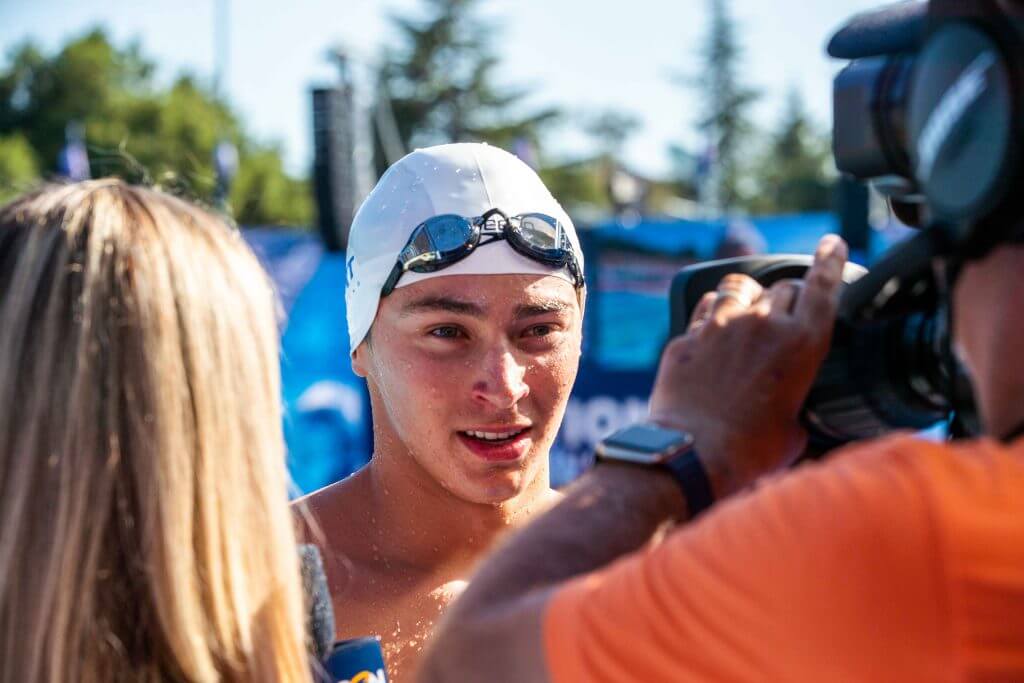
Luca Urlando Not Fazed By Pressure Heading Into First Olympic Trials
When 14-year-old Luca Urlando was watching the 2016 Olympic Trials on TV, he and his coach Billy Doughty at the Davis Aquadarts in California laid out a four year plan. The end goal for Urlando was to be a semifinalist at the 2020 Trials.
At the time, his 200 butterfly best time was a 2:05.64, which saw him lead the nation among 14-year-olds and his 100 fly was a 57.48. With an extra four years of natural progression, he figured a spot in semifinals on national TV at the 2020 Trials would be a reasonable goal.
But as the years went on and Urlando kept improving, that long-term semifinal goal started to change.
In 2018, a 16-year-old Urlando finished tied for third in the 200 butterfly at U.S. Nationals, a whisker away from making the Pan Pacs team. Before that day, he had only been under 2:00 in the 200 fly twice and wasn’t even a member of the National Junior Team. In prelims at Nationals, he swam a massive 1:56.01 and dropped to a 1:55.21 in finals, tying himself with the reigning national champ Jack Conger.
“It was kind of shocking,” Urlando told Swimming World in 2018. “It was almost unreal just because that was the biggest final I’ve ever been in, and I think it kind of helped that I had never been in that situation before. Being next to people like Tom Shields and other Olympians that were in that final, it was like, ‘Wow, I’ve kind of made it.’”
After those Nationals, Urlando just kept getting better and better.
A Star is Born
In December 2018, he took down Michael Phelps’ national age group record in the 200 yard butterfly at Junior Nationals. A few months later in May 2019, he set the national high school record in the 100 butterfly that had been previously set by Caeleb Dressel. And in June 2019, he broke another Phelps NAG record in the 200 butterfly in long course meters. This one put his name on the map as a future star – his 1:53.84 broke Phelps’ 1:53.93 from the 2003 Worlds, which at the time was the world record, and his time was quicker than what won silver and bronze at the World Championships that summer.
Even when an American reporter asked eventual gold medal winner Kristof Milak of Hungary at the 2019 Worlds after his semifinal of the 200 fly whether he wished Urlando had been present, he didn’t need his translator to say that he had been aware of the 17-year-old’s times.
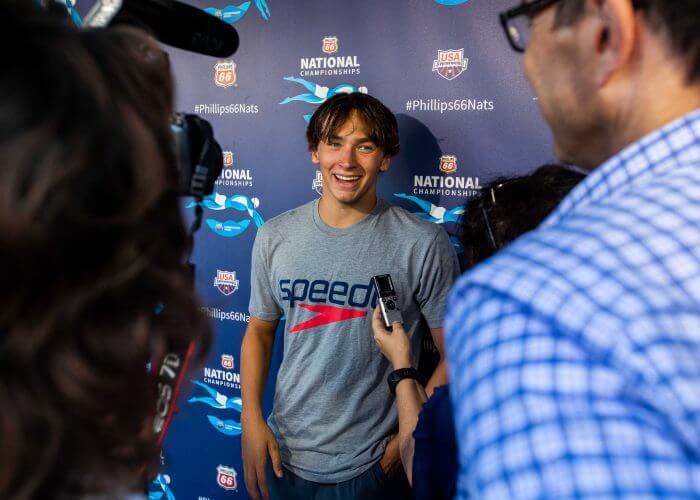
Teen phenom Luca Urlando interviews with the media at the 2019 USA Swimming Nationals; Photo Courtesy: Connor Trimble
With a huge lore growing around his name in 2019, Urlando didn’t feel uncomfortable by the fame and recognition he was getting from a young age.
“I try and think of myself as being cool under pressure and relaxed,” Urlando said. “I’m not a very antsy person. I love the hype that I was receiving and it fed into my swimming a little bit, and it made me more confident.”
Later on in 2019, Urlando was selected as a captain of the World Juniors team, where he won gold in the 200 free and 200 fly and was on three gold medal winning relays. Traveling overseas as a member of Team USA was invaluable for Urlando as he learned to deal with performing under pressure when the whole team was counting on him to do so. Even at the junior level, Urlando felt racing internationally in Budapest helped him prepare for racing at the senior level.
“Making any senior team meet and going to Trials and qualifying for it helps with stress under pressure,” Urlando said. “It definitely prepares you because you’re put in a lot of high pressure situations before events and the more you do it, the easier it becomes. With each junior meet I went to, I got a little better at dealing with that.”
Opportunity Knocks
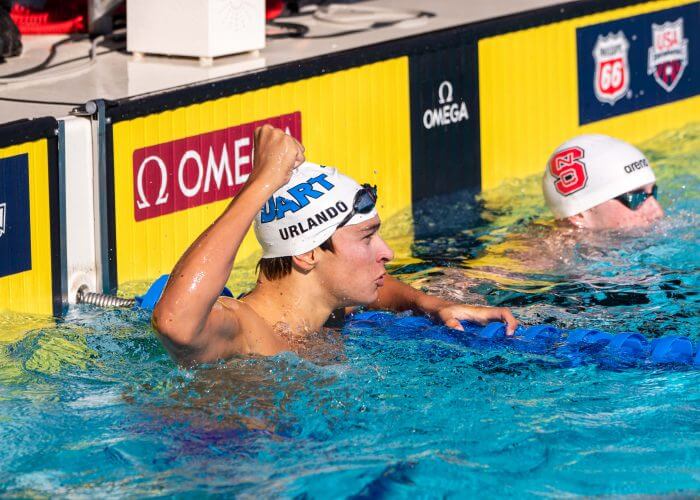
Luca Urlando pumps his fist after the 200 free at the 2019 US Nationals. Photo Courtesy: Connor Trimble
As the sun set on 2019 and an Olympic year emerged on the horizon, 2020 looked to be a historic year for the high school graduating class that had made their marks on the junior level as they seemed poised to make that next step to the senior team. Urlando’s name, along with Regan Smith, Phoebe Bacon, Alex Walsh and Carson Foster was being thrown around by swimming fans as one to watch in 2020 as he was finishing his club days with the Davis Aquadarts before he would join the team at the University of Georgia.
But 13 days into 2020, Urlando announced he had dislocated a shoulder during a workout and recovery would take a couple of months.
It turned out to be a blessing in disguise, however, since two months after announcing his injury, the COVID-19 pandemic postponed the Olympics to 2021, and not long after he moved across country to start school at the University of Georgia, to get a change of scenery a year before Trials.
“I definitely felt a certain urge that Trials was coming so close. It was definitely weird going through the injury and the Olympic Training Center and then while we were at the OTC the entire pandemic shut down real quick so I never felt that Trials was right around the corner. This extra year did help a lot.
“Being able to adapt to a different environment like college correlates into swim meets,” Urlando said of his freshman year. “This was a really strange year and all of us had to adapt in some way or another, and going into the perspective of swim meets – we had a different mindset of doing what I need to do and not worrying about external factors so that’s a way I’ve gotten better this year.”
Urlando actually had a subluxation in his shoulder in December, which is not a full dislocation but enough to set him back going into the college championship season in February and March. Regardless of the setback, he was SEC champ in the 200 fly and made both A-Finals in the butterfly events in his NCAA debut.
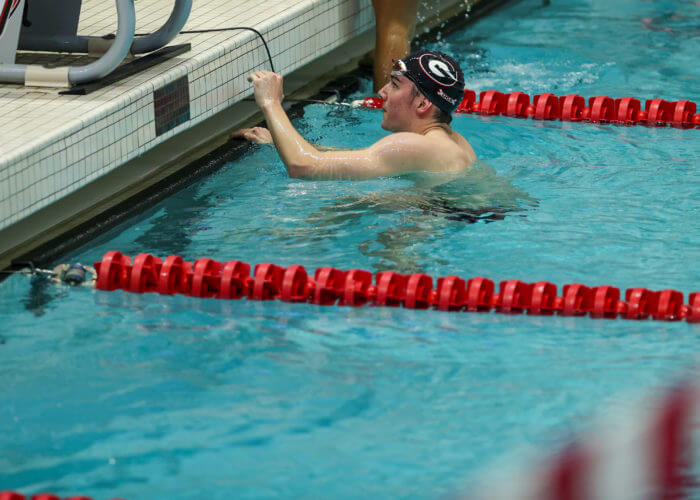
Luca Urlando racing for Georgia. Photo Courtesy: Chamberlain Smith / Georgia Athletics
“Being on this (Georgia) team really helped me prepare mentally and physically growing stronger to deal with my injury,” Urlando said.
“It definitely made me think about swimming in a different way. I don’t think I am going to have the same type of strokes or be able to move my body in the same way that I’m used to. I think because of that I have become stronger in other aspects of my swimming.”
Training with such a competitive group at Georgia has helped as well. The Bulldogs nearly won the program’s first SEC title since 1955, and finished in the top four nationally for the first time since 1997, before Urlando was even born. Among the Georgia pro group, six of them have represented the United States at the World Championships, setting the intensity every single day that has helped elevate the group to a higher level.
With less than a week until Urlando races at the Olympic Trials, he is once again a favorite to make the team in the 200 butterfly and 200 freestyle. This year alone, Urlando is ranked fourth nationally in the 200 butterfly, 15th in the 100 fly, and 27th in the 200 freestyle.
He will enter Trials as the top seed in the 200 butterfly, but doesn’t feel the pressure that comes with that.
“I know what I’m capable of doing. I’m sure other people know too but coming into Trials I am confident in my abilities to do what I need to get done. I wouldn’t say I have a target on my back.”
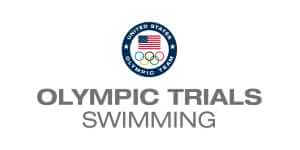

- 2016 USA TRIALS ARCHIVE
- ARCHIVES OF OLYMPIC TRIALS VIA SWIMMING WORLD VAULT
- 2021 USA OLYMPIC TRIALS WAVE I CUTS
- 2021 USA OLYMPIC TRIALS WAVE II CUTS
- HEAD USA OLYMPIC COACHES
- 2016 FULL RESULTS
- WAVE I FULL RESULTS
- PSYCH SHEET
- DAY ONE RESULTS
- DAY TWO RESULTS
- DAY THREE RESULTS
- DAY FOUR RESULTS
- DAY FIVE RESULTS
- DAY SIX RESULTS
- DAY SEVEN RESULTS
- DAY EIGHT RESULTS



